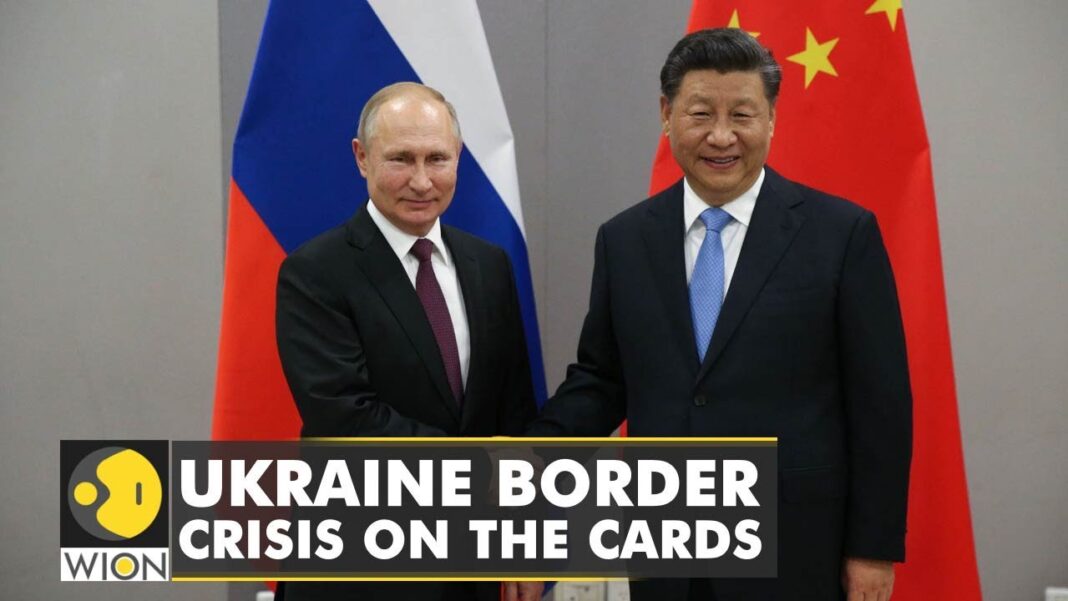
KEY TAKEAWAYS
- Larry Fink has emerged as the point man for environmental, social, and corporate governance capitalism, broadly known as ESG.
- Identity politics seeks nothing less than to input the invisible economy’s ledger of sin and guilt into the visible economy of profit and loss, debt and credit.
- BlackRock still must account for its actions in China under the standards of identity politics.
Larry Fink has emerged as the point man for environmental, social, and corporate governance capitalism, broadly known as ESG. As chief executive officer of BlackRock, which holds a $10 trillion global portfolio, Fink leverages this immense power to compel companies that BlackRock invests in to comply with an aggressive climate change and diversity agenda in their operations.
Fink’s BlackRock is committed to a net-zero carbon strategy, and seeks global conformity across its clients on sustainability reporting measures, i.e., they must prove that their companies are seeking this goal.
His annual letter to CEOs is closely read, and, it would seem, followed. In 2020, he stated that BlackRock “will be increasingly disposed to vote against management and board directors when companies are not making sufficient progress on sustainability-related disclosures and the business practices and plans underlying them.”
His 2021 letter noted the valiant protests for racial justice in 2020. And concluded that companies must meet the demands of protestors: “we ask that your disclosures on talent strategy fully reflect your long-term plans to improve diversity, equity, and inclusion, as appropriate by region.”
All of this, we are told, leads to more profitable companies. For those corporate doubting Thomases, they too must learn to become profitable by following a detailed ESG disclosure regimen. But something does not quite sum here.
Last year, BlackRock sided with “Engine No. 1,” an activist investment fund that replaced directors on ExxonMobil with three of its selections because of a belief that the corporation was not seriously confronting the challenges of climate change in its business strategy. The new directors then attempted to compel the company to divest oil and gas fields in Mozambique and Vietnam. The gaping need is to look for more environmentally sustainable investments in green energy, they argued.
As a slow rolling energy crisis and its increase in demand for conventional energy has emerged in 2021 and 2022, that view is a bit precious.
From whence does Fink’s breathless enthusiasm come? And why does it find such a receptive, pliable audience? To take climate change, most of America’s, and presumably the world’s progress, in decreasing its carbon footprint will come through technological growth and the impacts this growth will have on numerous industries. Companies will find themselves more productive while using less energy.
Coerced investments in sustainable energy technologies, whose markets are heavily created by state intervention, will likely prove negligible in lowering carbon emissions by comparison.
To gain understanding of Fink’s actions, we need to go deeper into the spiritual awakening in identity politics that could reshape virtually every institution in America and the West. In “American Awakening,” Joshua Mitchell argues that identity politics is a religious revival seeking salvation by replacing the substance of justice with the supplement of mercy.
Justice is the arduous task of giving to each person what is due to them. Our voluntary institutions in work, politics, and civic associations are predicated on us attempting and generally getting this virtue right. Mercy, Mitchell observes, is the supplement when we don’t. We ask and hope to be granted forgiveness when we fail our neighbor.
Mitchell further observes that we live in two worlds, two economies, the visible and invisible. Both are necessary to the human person.
The visible, tangible economy concerns profit and loss, debt and credit. These accounts must be measured and settled if the work of a modern economy is to go forward. The invisible economy is also part of our existence. Here, we deal with perennial notions of sin, guilt, forgiveness, and mercy.
Accounts in the invisible economy frequently can’t settle. Sins are too great; forgiveness is not sought; and the guilty go unpunished. Biblical religion has provided us the means to understand the enormity of these unmet accounts, and to help us live under their weight. But they remain different worlds, separate economies that we live in.
Identity politics seeks nothing less than to input the invisible economy’s ledger of sin and guilt into the visible economy of profit and loss, debt and credit. But it redesigns the invisible economy by its conception of sin and guilt. There is no original sin, only an original sinner, the heterosexual white male. And there are victims, holy innocents.
The heterosexual white male’s guilt cannot be atoned, he must endlessly bleed and attempt to show his innocence. Mitchell notes this is the most he can do. On him hangs the sins of colonialism, slavery, racism, sexism, bigotry against sexual minorities, and the rank injustice of the capitalist economy.
These sins committed by the transgressor against the innocent are unforgiveable. And this also means that our inheritance, defined and made by the white heterosexual male, is poison and must be replaced. There are only two terms: sinner and innocent.
Thus, identity politics replaces the liberal politics of deliberation, compromise, and building institutions with others and proclaims an illiberal politics that supplants our irredeemable inheritance.
And identity politics must be illiberal politics because it seeks the mercy of the invisible economy in the visible economy, and that latter economy cannot pay what is without cost. As Mitchell observes, if you eliminate the visible economy, you also eliminate justice.
But mercy needs justice. Mercy without justice becomes tyranny. Does Mitchell not give us the needed leverage to understand not only what amounts to the corporatist hijinks of Fink, but the unpayable debts sought by today’s Democratic Party, whose motivations and thought increasingly reflect the mindset of identity politics?
If the visible economy of the capitalist world is bound up with patriarchal white male sin and must be replaced with the mercy of the invisible economy as understood by identitarians, then, Mitchell notes, we can understand “the impossibly expensive Green New Deal and the demand that there be free health insurance, or free college tuition, or socialism—which for the upcoming generation is a proxy, really, for the negation of the “capitalist” world of payment.” And this “produces a citizen who demands everything and thinks he deserves everything.”
Might we also understand Larry Fink’s incessant push to remake global capitalism into a crusade for environmental atonement and diversity and racial equity? When identity politics approaches the environment, Mitchell reasons, it finds nature poisoned, another holy innocent besmirched by the white man’s economy. Accordingly, “the stain of “anthropogenic climate change” must be wiped away, either by dismantling the world white, heterosexual men have built with “unclean” energy or by sustaining that world only with “clean,” green energy.”
Larry Fink’s charge to the “international community” of transnational institutions, corporations, and governments to plan comprehensively for a capitalist net-zero carbon economy by 2050 becomes similarly rational once we grasp the identity politics component that drives it.
Fink proclaims not his virtue; he proclaims his innocence. As a white male capitalist, he is inherently tied to the “unclean” substance—carbon dioxide—and the sins it commits on holy nature. Can it be redeemed under a new order dictated by the invisible economy of identity politics?
Fink’s calling is to make it so. So limitless are the debts of this economy that even BlackRock must acknowledge the inability of the visible economy to settle the account. BlackRock remains invested in unclean companies. And the protestors in front of BlackRock’s offices accusing them of hypocrisy and backsliding remind them of it. In the old religion, the path to hell was easy, the road to heaven was hard. Something of that remains.
ESG requirements on publicly traded companies are expensive and can lead to competitive disadvantages. Many companies will refuse them or accept them and then shirk. To deal with these sinners will require government orders, and the SEC now attempts to fill the void with proposed rules to mandate disclosure about sustainable business models and diversity metrics on their boards and employees.
Even here, BlackRock and others implore the SEC to go beyond its public company statutory mandate by similarly mandating private companies to comply with ESG disclosure requirements. As reported in the Wall Street Journal, BlackRock’s public comment to the proposed SEC rule stated “we encourage the SEC to explore its existing regulatory authority to mandate climate-related disclosures with respect to large private market issuers” in order “to avoid regulatory arbitrage.” No stone will be left unturned.
What to make, then, of BlackRock’s extensive operations in China, including being invited by the CCP to be the first foreign company to sell mutual fund investments to Chinese investors? BlackRock has poured its clients’ money into Chinese investments.
Of course, BlackRock also has ownership stakes in Chinese companies iFlytech and Hikavision, the former develops AI and voice recognition software while Hikavision manufactures surveillance equipment. Both companies were blacklisted by the United States government for participating in human rights abuses against Uyghur Muslims in Xinjiang. BlackRock is invested in both and increased its holdings in Hikavision after the blacklisting.
Certainly, being a favored company like BlackRock in China’s strong-man economy guarantees a favorable return on investment. But BlackRock still must account for its actions in China under the standards of identity politics. The classic refrain of needing to be inside the system to change it, surely will be voiced. But, ultimately, within the communion of holy innocents, American capitalism, led by the innocence-seeking hands of Fink, must become China’s carbon offset.
The invisible economy is a vengeful paymaster.
By Richard Reinsch
Senior Fellow at The Heritage Foundation and Columnist at The Daily Signal







